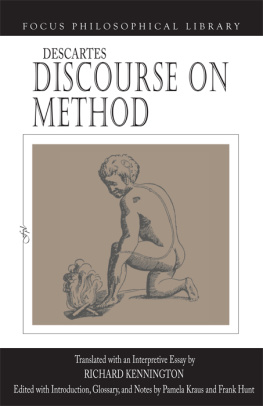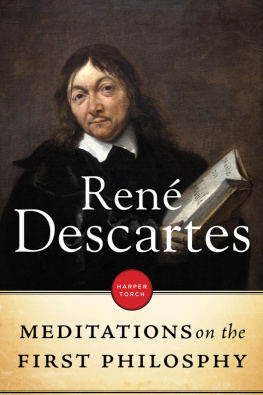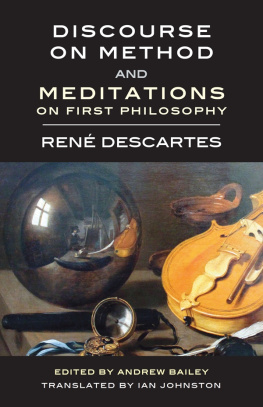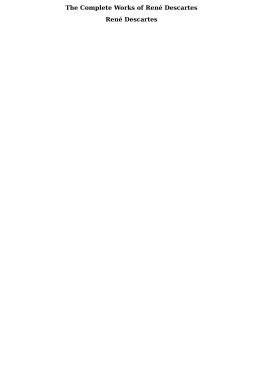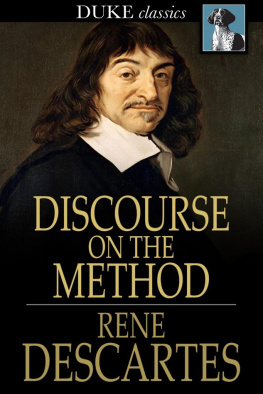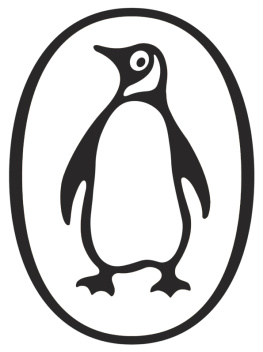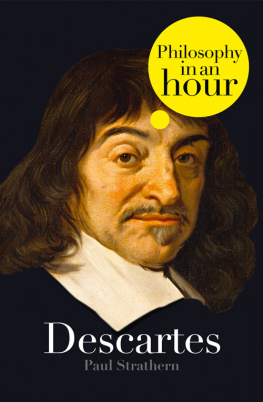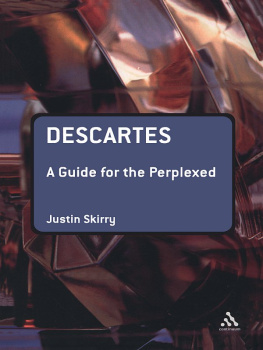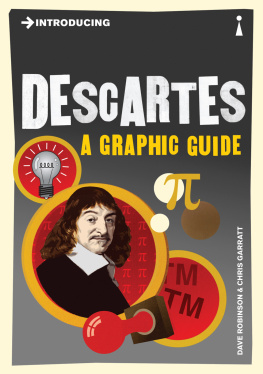René Descartes - Discourse on Method
Here you can read online René Descartes - Discourse on Method full text of the book (entire story) in english for free. Download pdf and epub, get meaning, cover and reviews about this ebook. year: 2012, publisher: Hackett, genre: Science. Description of the work, (preface) as well as reviews are available. Best literature library LitArk.com created for fans of good reading and offers a wide selection of genres:
Romance novel
Science fiction
Adventure
Detective
Science
History
Home and family
Prose
Art
Politics
Computer
Non-fiction
Religion
Business
Children
Humor
Choose a favorite category and find really read worthwhile books. Enjoy immersion in the world of imagination, feel the emotions of the characters or learn something new for yourself, make an fascinating discovery.
- Book:Discourse on Method
- Author:
- Publisher:Hackett
- Genre:
- Year:2012
- Rating:4 / 5
- Favourites:Add to favourites
- Your mark:
- 80
- 1
- 2
- 3
- 4
- 5
Discourse on Method: summary, description and annotation
We offer to read an annotation, description, summary or preface (depends on what the author of the book "Discourse on Method" wrote himself). If you haven't found the necessary information about the book — write in the comments, we will try to find it.
Discourse on Method — read online for free the complete book (whole text) full work
Below is the text of the book, divided by pages. System saving the place of the last page read, allows you to conveniently read the book "Discourse on Method" online for free, without having to search again every time where you left off. Put a bookmark, and you can go to the page where you finished reading at any time.
Font size:
Interval:
Bookmark:
Ren Descartes
DISCOURSE ON METHOD
The Focus Philosophical Library
Aristotle De Anima M. Shiffman
Aristotle Nicomachean Ethics J. Sachs
Aristotle Poetics J. Sachs
Athenian Funeral Orations J. Herrman
Descartes Discourse on Method R. Kennington
Empire and the Ends of Politics (Plato/Pericles) S. D. Collins and D. Stauffer
Four Island Utopias (Plato, Euhemeros, Iambolous, Bacon) D. Clay and A. Purvis
Hegel The Philosophy of Right A. White
Lucretius On the Nature of Things W. Englert
Plato and Xenophon Apologies M. Kremer
Plato Euthydemus M. Nichols
Plato Gorgias J. Arieti and R. Barrus
Plato and Aristotle Gorgias and Rhetoric J. Sachs
Plato Meno G. Anastaplo and L. Berns
Plato Parmenides A. K. Whitaker
Plato Phaedo E. Brann, P. Kalkavage, and E. Salem
Plato Phaedrus S. Scully
Plato Politics J. Sachs
Plato Republic J. Sachs
Plato Sophist E. Brann, P. Kalkavage, and E. Salem
Plato Statesman E. Brann, P. Kalkavage, and E. Salem
Plato Symposium A. Sharon
Plato Theatetus J. Sachs
Plato Timaeus P. Kalkavage
Socrates and Alcibiades Four Texts D. Johnson
Socrates and the Sophists J. Sachs
Spinoza Theologico-Political Treatise M. Yaffe
Ren Descartes
DISCOURSE ON METHOD
Translated with an
Interpretive Essay by
Richard Kennington
Edited with Introduction,
Glossary, and Notes by
Pamela Kraus and Frank Hunt
Focus Publishing: An Imprint of Hackett Publishing Company
Indianapolis/Cambridge
Discourse on Method
Ren Descartes
2007 Pamela Kraus and Frank Hunt
Previously published by Focus Publishing/R. Pullins Company
Focus Publishing
An Imprint of Hackett Publishing Company
www.hackettpublishing.com
P.O. Box 44937
Indianapolis, Indiana 46244-0937
ISBN 978-1-58510-566-3
Also available in paperback (ISBN 978-1-58510-259-4). Some content that appears in the print edition may not be available in other formats.
All rights are reserved.
Last updated June 2012
The Discourse on the Method of Conducting Ones Reason Well andSeeking Truth in the Sciences was published anonymously at Leiden in June of 1637 together with the Dioptrics, the Meteors, and the Geometry, which are called on the title page essays in this method. Of the title of the Discourse, Descartes wrote: I do not put Treatise on the Method but Discourse on the Method, which is the same as Preface or Notice Concerning the Method, in order to show that I do not intend to teach the method, but solely to speak about it. For, as can be seen from what I say about it, it consists more in practice than in theory. And I name the following treatises Essays in This Method because I claim that the things they contain could not have been discovered without it, and because one can know by them what it is worth. So too I have inserted something of metaphysics, physics, and medicine in the preceding Discourse, in order to show that the method extends to all sorts of matters (letter to Mersenne, 27 February 1637 [?]; AT 1:349).
Richard Kennington prepared more than one version of this translation before his death in 1999. We have edited and revised the translation in comparison with the original as printed in Oeuvres de Descartes, edited by Charles Adam and Paul Tannery, revised edition, 12 volumes (Paris: Vrin, 1964-76; abbreviated AT), 6:1-78. Pages of AT, volume 6, have been supplied in square brackets in the text. Where we have had to choose between consistency of translation and a slightly more idiomatic English, we have generally opted for the former. (For example, the expression jose dire, which might have been conveyed more idiomatically by I venture to say, has been translated I dare to say, in conformity with the translation of oser by dare elsewhere.) Our intention is to allow readers to follow important terms through the text. To take only one example, readers should be able to connect the discussion of masters in the beginning of Part 2 with the project of making ourselves masters and possessors of nature articulated in Part 6.
We have supplied a glossary, an index, and notes, some of which are indebted to tienne Gilson, Discours de la mthode, texte et commentaire, sixth edition (Paris: Vrin, 1987). The interpretive essay was originally a lecture delivered in the Collegiate Lecture Series in the Liberal Arts at the University of Chicago on February 21, 1980. It was published in Richard Kennington, On Modern Origins: Essays in Early Modern Philosophy, edited by Pamela Kraus and Frank Hunt (Lanham: Lexington Books, 2004), 105-22, and is reprinted here by kind permission of the publisher.
The editors thank Janice Johnson, Terry and Annie Marshall, Sarah Navarre, Ron Pullins, Joe Sachs, John Tomarchio, Kathleen Blits, and an anonymous reader for Focus Publishing for their help with the translation and its publication.
Pamela Kraus and Frank Hunt
Annapolis and Santa Fe
The Discourse on Method (1637) is a brief writing that serves as a preface to three scientific essays (the Optics, the Geometry, and the Meteorology). Of the writings of Ren Descartes (1596-1650), it is the most widely read and is often assigned in university courses, both graduate and undergraduate, and across various disciplineshumanities, history, literature, rhetoric, history of scienceas well as philosophy. Its popularity is in part a consequence of its authors renown. Descartess singular contributions to philosophy, mathematics, and physics place him among the luminaries of his time. He simplified and augmented the power of mathematics through his discovery of analytic geometry; he formulated an account of nature as matter, and of matter as having qualities primarily geometrical in character, rendering it susceptible of mathematical treatment; he enumerated three laws of nature, by which all motions whatsoever are governed, inspiring a line of development to Isaac Newton; he redefined the soul, bequeathing us the notion of mind or consciousness, a domain marked off from that of body or matter; he made prominent a conception of philosophy in which this endeavor to understand the whole of things required prior reflection on and evaluation of the cognitive powers; and he thereby established the good of inquiry as accessible to many rather than restricted to the province of a few, and as beneficial for mankind rather than directed beyond human capability. The Discourse on Method succinctly describes all these contributions and their relation to one another.
Yet the Discourse is perhaps as much appreciatedand as noteworthyfor its form and style. It is by design not a treatise, but a discourse (Fr. discours), a word with a wider significance in the seventeenth century than today, meaning talk or conversation.
and would seem to be a paradigm of the philosophy it espouses: nonacademic, productive, and available.
Yet the Discourse is not simply accessible. While its full title is Discourse on the Method of Conducting Ones Reason Well and Seeking Truth in the Sciences, it lists without elaboration four rules of method and contains no sustained or developed arguments on any topic. Its longest continuous passage is that in Part 5 describing the circulation of the blood. Descartes tells his correspondent Marin Mersenne in 1637, I do not put Treatise on the Method but Discourse on the Method, which is the same as Preface or Notice Concerning the Method, in order to show that I do not intend to teach the method, but solely to speak about it. For, as can be seen from what I say about it, it consists more in practice than in theory.I have inserted something of metaphysics, physics, and medicinein order to show that the method extends to all sorts of matters. Descartes, then, designs his preface as a summary so that the full power of his method should become evident, but withholds from the reader a full or direct presentation of it. Instead he conveys his thought in an autobiographical account. The narrator is not a pure mind standing behind a treatise on a recondite or rarified subject, or a philosopher speaking only to other philosophers, but a man speaking to all men, highlighting his endeavor to acquire a clear and assured knowledge of all that is useful for life. As a man, of course, he is not just any man, as we quickly learn from Part 1 of the
Next pageFont size:
Interval:
Bookmark:
Similar books «Discourse on Method»
Look at similar books to Discourse on Method. We have selected literature similar in name and meaning in the hope of providing readers with more options to find new, interesting, not yet read works.
Discussion, reviews of the book Discourse on Method and just readers' own opinions. Leave your comments, write what you think about the work, its meaning or the main characters. Specify what exactly you liked and what you didn't like, and why you think so.

